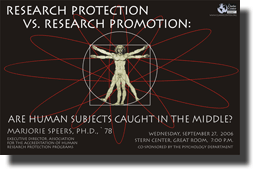Wednesday, September 27, 2006
Research Protection vs. Research Promotion
Stern Center, Great Room, 7:00 p.m.

Issue in Context
The basis of all science lies in repeatable experiments that yield evidentiary results for or against a hypothesis. The only way to obtain relevant results about human response is to utilize human subjects in the experiment. However, doing experiments with human subjects instigates a deluge of complications. The demand for better regulation of human research experiments began with the Nuremburg Code after the Nazi exploitation of unconsenting prisoners of concentration camps. Now Institutional Review Boards (IRBs) carefully examine every step of the research process, from experiment design to the relevance of the potential findings to selecting human subjects. These boards, established by the US Department Health, Education and Welfare, are responsible for determining and preserving the fine line between sufficiently protecting research subjects and unnecessarily hindering research processes.
About the Speaker
Marjorie A. Speers, Ph.D is the current executive director of the Association for the Accreditation of Human Research Protection Programs (AAHRPP). From 1999 to 2001 she was acting Executive Director of the National Bioethics Advisory Commission. She also managed the development of a report on the research oversight system, “Ethical and Policy Issues in Research Involving Human Participants.†Marjorie Speers oversaw domestic and international research as Deputy Associate Director for Science at the Centers for Disease Control and Prevention (CDC). Prior to this, she held several other positions at the CDC, including Director of the Division of Chronic Disease Control and Community Intervention, Chief of the Aging and Statistics Branch, and staff epidemiologist. Dr. Speers also was a faculty member at the University of Texas Medical Branch and the University of Connecticut – Stamford . She has largely focused her extensive public health research on prevention and health promotion. Dr. Speers received her doctoral degrees in psychology and epidemiology from Yale and her bachelor’s degree in psychology from Dickinson College in 1978.
Related Links
– U.S. Department of Health and Human Resources, Office for Human Research Protections
-Association for the Accreditation of Human Research Protection Programs
-IRB Guidebook
-The Institutional Review Board – Discussion and News Forum
